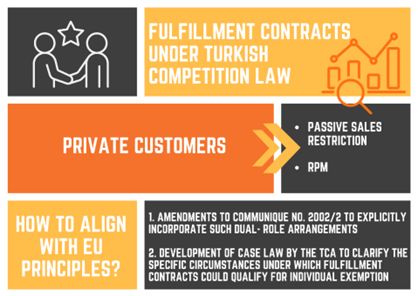Introduction
The introduction of the concept of "fulfillment contracts" under the European Union's revised Vertical Block Exemption Regulation ("VBER") and its Guidelines on Vertical Restraints has created a structured exception to the prohibition on resale price maintenance ("RPM") in vertical agreements. These contracts allow suppliers to impose fixed resale prices on buyers under specific conditions, particularly when fulfilling prior agreements concluded between the supplier and a specific customer.
In Turkey, vertical agreements are scrutinized under Article 4 of the Act No. 4054 on the Protection of Competition ("Turkish Competition Act")1, which prohibits agreements that restrict competition. While RPM is considered a hardcore restriction under Turkish law, certain exceptions in the Turkish Vertical Agreements Guidelines, particularly regarding agency models, suggest alignment possibilities for similar practices like fulfillment contracts.
This article evaluates the operational framework of fulfillment contracts under the VBER and discusses their potential implications within the Turkish competition law framework.
1. Fulfillment Contracts Defined in VBER
Under the New VBER, which came into force on 1 June 2022, fulfillment contracts are defined as vertical agreements where a supplier designates a buyer (e.g., a distributor or dealer) to execute a pre-existing supply agreement between the supplier and a specific customer.
Recital 193 of the Guidelines on Vertical Restraints specifies that fulfillment contracts operate under the following conditions:
- The supplier selects a buyer (e.g., a distributor or dealer) to execute the supply agreement already concluded with the customer.
- The supplier's imposition of fixed resale prices during fulfillment does not breach RPM prohibitions.
This exemption is based on the premise that competition has already occurred during the supplier's negotiation with the customer for both the supply contract and the execution services. Consequently, imposing a fixed resale price at the execution stage does not distort competition, as emphasized in Recital 193 of the Vertical Guidelines.
This model is particularly relevant for "key accounts," such as large corporate buyers or government entities, which prefer negotiating terms directly with manufacturers. Such consistency enhances operational certainty for these customers.
2. How Fulfillment Contracts Can Be Displayed and Interpreted Under Turkish Competition Act
2.1 Supplier May Attain "Private Customers"
In Turkey, unlike the EU framework under the VBER, there is no explicit recognition of "fulfillment contracts" as an exception to the prohibition on RPM or restrictions on passive sales. Consequently, practices that involve managing private customer orders through downstream dealers or distributors may raise concerns under Turkish competition law if they limit competition between distributors or interfere with dealers' independent decision-making.
Suppliers in Turkey often interact with private customers by directing their orders to downstream dealers or distributors for fulfillment. However, such practices must align with the principles established under Article 4 of Turkish Competition Act and the Turkish Vertical Agreements Guidelines to avoid anti-competitive behavior.
A supplier's involvement in private customer transactions could potentially contravene Article 4 if the following behaviors are observed:
- Restricting Passive Sales: Preventing a dealer from fulfilling unsolicited orders from private customers could constitute a hardcore restriction of competition. For instance, if a private customer in Region A approaches Dealer X, and the supplier prohibits Dealer X from completing the sale in favor of Dealer Y in Region B, this restriction could amount to a passive sales prohibition under Turkish competition rules. Such restrictions are explicitly excluded from benefiting from the block exemption provided under Block Exemption Regulation No. 2002/2 on Vertical Agreements ("Regulation No. 2002/2") and must be assessed under the individual exemption criteria of Article 5. However, given that these restrictions are considered anti-competitive by object, meeting the individual exemption conditions is exceedingly difficult.
- RPM: Suppliers imposing fixed or minimum resale prices on dealers for private customer orders are likely to breach the strict prohibition on RPM. Similar to passive sales restrictions, RPM is classified as a hardcore violation under Turkish competition rules and is also excluded from the scope of block exemptions provided under Regulation No. 2002/2. Any attempt to justify RPM would require an individual exemption under Article 5, but as it is considered by the Turkish Competition Authority ("TCA") as an anti-competitive practice by object, satisfying these criteria is highly improbable.
Even indirect forms of interference, such as delaying supplies to a non-complying dealer or providing incentives conditional on adherence to specific pricing or customer allocation practices, could be deemed anti-competitive. For example, if a supplier delays deliveries to Dealer X because it offered a discount to a private customer that deviates from the supplier's pricing expectations, this may qualify as an unlawful RPM practice.
Given that Turkish competition law does not explicitly recognize fulfillment contracts as a valid exception under the Regulation No. 2002/2, such arrangements cannot benefit from the group exemption. However, it is considered that these contracts may still be assessed for individual exemption, potentially drawing on the principles of the EU's VBER. Therefore, the key argument should focus on the possibility of securing an exemption through an individual exemption analysis.
2.2 Exclusive Authorization of the Provider for Sales to "Private Customers" and the Subsequent Engagement of an "Agent" for These Sales
An alternative structure involves revising dealership agreements to grant the supplier exclusive rights to handle private customer sales, supplemented by an agency model for fulfillment.
Under the Turkish Commercial Code, an agent is defined as a party that mediates contracts or performs sales on behalf of a principal without assuming commercial or financial risks. This agency structure offers several compliance benefits:
- Exemption from Article 4: Restrictions imposed on agents, such as resale price limitations or customer exclusivity, fall outside the scope of Article 4, provided the agent does not bear risks or costs related to the transactions.
- Supplier-Controlled Pricing: The supplier retains full authority to determine sales terms, including price and quantity, for private customer orders handled through agents.
In this structure, agents merely facilitate transactions and ensure fulfillment. For example, an agent could issue invoices or coordinate logistics for private customer sales without assuming ownership of the goods. This proposed structure, while compliant under Turkish law, presents certain challenges when viewed through the lens of EU competition law. Notably, the EU VBER and accompanying Guidelines highlight significant limitations when defining a buyer as both a reseller and an agent for the same product category in specific customer segments. The EU perspective argues that such dual roles inherently involve risk assumption, thereby disqualifying the agent from being considered risk-free as required under the exemption.
This inconsistency raises questions about the alignment of the proposed structure with EU competition standards. Addressing this divergence would require one of two approaches:
- Amendments to Regulation No. 2002/2 to explicitly incorporate such dual-role arrangements.
- Development of case law by the TCA to clarify the specific circumstances under which fulfillment contracts could qualify for individual exemption.
While the first approach ensures legal certainty and operational efficiency—avoiding the costs and delays associated with multiple individual exemption applications—the second approach may still lead to prolonged uncertainty and reduced efficiency in the short term. Thus, aligning the Turkish framework more closely with the EU by revising Regulation No. 2002/2 may offer a more practical and effective solution.

Conclusion
The EU's introduction of fulfillment contracts under the VBER offers a pragmatic exception to RPM prohibitions and passive sales restrictions, addressing competition concerns at the negotiation stage rather than during execution. In Turkey, however, strict prohibitions on RPM and passive sales restrictions create significant hurdles for similar practices.
While fulfillment contracts lack explicit recognition under Turkish competition law, individual exemptions under Article 5 of Turkish Competition Act and agency models for private customer transactions present potential pathways for compliance. To enhance clarity and alignment with EU principles, revising Regulation No. 2002/2 or developing case law would provide a more predictable framework, benefiting both competition and business operations.
Footnote
1. "Agreements and concerted practices between undertakings, and decisions and practices of associations of undertakings which have as their object or effect or likely effect the prevention, distortion or restriction of competition directly or indirectly in a particular market for goods or services are illegal and prohibited."
The content of this article is intended to provide a general guide to the subject matter. Specialist advice should be sought about your specific circumstances.


